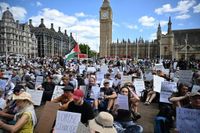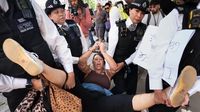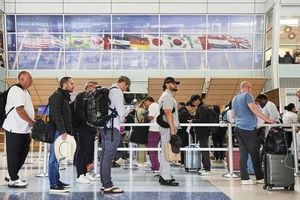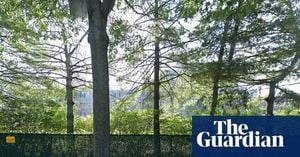London’s Parliament Square was the scene of a dramatic standoff on August 9, 2025, as more than 500 people were arrested during protests against the UK government’s recent ban of Palestine Action, a pro-Palestinian group now officially classified as a terrorist organization. The events, described by many as a direct challenge to the government’s ability to enforce its controversial new policy, have sparked fierce debate across the country about civil liberties, public safety, and the boundaries of protest in a democratic society.
According to the Metropolitan Police Service, a total of 532 individuals were detained during Saturday’s operation, with 522 accused of violating anti-terror laws by displaying placards or other items expressing support for Palestine Action. The remaining 10 arrests were attributed to a variety of offenses, including assaulting and obstructing police officers, breaching Public Order Act conditions, and one racially aggravated public order offense. The demonstration, organized by Defend Our Juries and held at Parliament Square, was closely monitored by police, who had warned beforehand that anyone expressing support for the banned group would be detained.
The crackdown was not without controversy. Photos splashed across Sunday’s newspapers showed elderly protesters—some in their 80s and 90s—being escorted away by officers. In fact, almost half of those arrested were over the age of 60, and a breakdown published by the Met revealed that 348 detainees were aged 50 or older. La Pethick, an 89-year-old retired psychotherapist, told the Times of London, “We are having our right to peaceful protest being taken away.” She added that her family, including her five grandchildren, supported her decision to protest.
Supporters of Palestine Action openly admitted that the protest was intended to test the government’s resolve. The group, which describes itself as a direct-action network targeting companies involved in supplying Israel’s military, has previously been linked to high-profile acts of civil disobedience. Notably, activists broke into a Royal Air Force base and spray-painted two tanker planes at RAF Brize Norton earlier this summer, an incident that was cited as a key reason for the government’s decision to outlaw the organization. The ban, enacted under the Terrorism Act 2000 in June and later approved by both the House of Commons and House of Lords in July, is now being challenged in the courts by Palestine Action’s co-founder, Huda Ammori, who has been granted permission by the High Court to bring a full judicial review against the Home Secretary’s order.
Home Secretary Yvette Cooper, who oversees law enforcement in Britain, defended the ban in a statement, saying, “The right to protest is one we protect fiercely but this is very different from displaying support for this one specific and narrow, proscribed organization.” She continued, “Many people may not yet know the reality of this organization, but the assessments are very clear, this is not a nonviolent organization.”
Justice Minister Alex Davies-Jones echoed these sentiments in an interview with BBC Breakfast on August 11, stating, “With regards to Palestine Action, they are a proscribed terrorist organization and their actions have not been peaceful. They have violently carried out criminal damage to RAF aircraft. We have credible reports of them targeting Jewish-owned businesses here in the United Kingdom, and there are other reasons, which we can’t disclose because of national security.” She added, “Anyone showing support for that terrorist organization will feel the full force of the law.” Davies-Jones also thanked police for their “bravery and courage” during the operation, emphasizing that while the right to peacefully protest is a cornerstone of British democracy, supporting a proscribed group crosses a legal and moral line.
The process of charging those arrested is expected to take weeks, as officers from the Met’s Counter Terrorism Command assemble case files and seek approval from the Crown Prosecution Service and, in some instances, the Attorney General. Some of those detained were released on bail with conditions not to attend future demonstrations related to Palestine Action. However, police acknowledged that it would be “entirely unrealistic” for officers to recognize every individual who might return to Parliament Square, and their focus remained on those actively committing offenses.
The arrests have drawn criticism from several quarters. The UN High Commissioner for Human Rights has publicly criticized the UK’s decision to ban Palestine Action, and the UN special rapporteur on counter-terrorism and human rights has been granted permission to intervene in the judicial review. Supporters of Palestine Action argue that the government is overreaching by restricting freedom of expression and the right to protest. They maintain that their actions are aimed at holding the UK government accountable for its support of Israel’s military operations in Gaza and that the ban is an attempt to silence legitimate dissent.
Parliament’s decision to proscribe Palestine Action followed a series of increasingly disruptive protests. In addition to the RAF Brize Norton incident, the group has targeted Israeli defense contractors and other sites in Britain believed to have links with the Israeli military. According to the government, these actions have resulted in significant injuries and extensive criminal damage, justifying the group’s designation as a terrorist organization. However, Palestine Action and its legal team argue that the ban is a violation of human rights law and are seeking to overturn it in court.
The broader pro-Palestinian movement in the UK remains divided over the government’s approach. While some activists see the ban as an attack on civil liberties, others worry that the actions of Palestine Action could undermine the legitimacy of peaceful protest and draw unwanted attention from law enforcement. The debate has also spilled into the political arena, with government ministers insisting that public safety must come first, and opposition figures calling for a more nuanced response that balances security concerns with the need to protect fundamental rights.
Meanwhile, the families of those arrested are left waiting for answers. With the legal process expected to drag on for weeks, and possibly months, the fate of hundreds of protesters hangs in the balance. As the government doubles down on its commitment to enforce the ban, and activists prepare for a lengthy court battle, the events of August 9 have set the stage for a high-stakes confrontation over the future of protest and dissent in Britain.
Whatever the outcome, the mass arrests in London have forced a reckoning with the limits of free expression, the responsibilities of protest, and the enduring tensions between security and liberty in a modern democracy.






